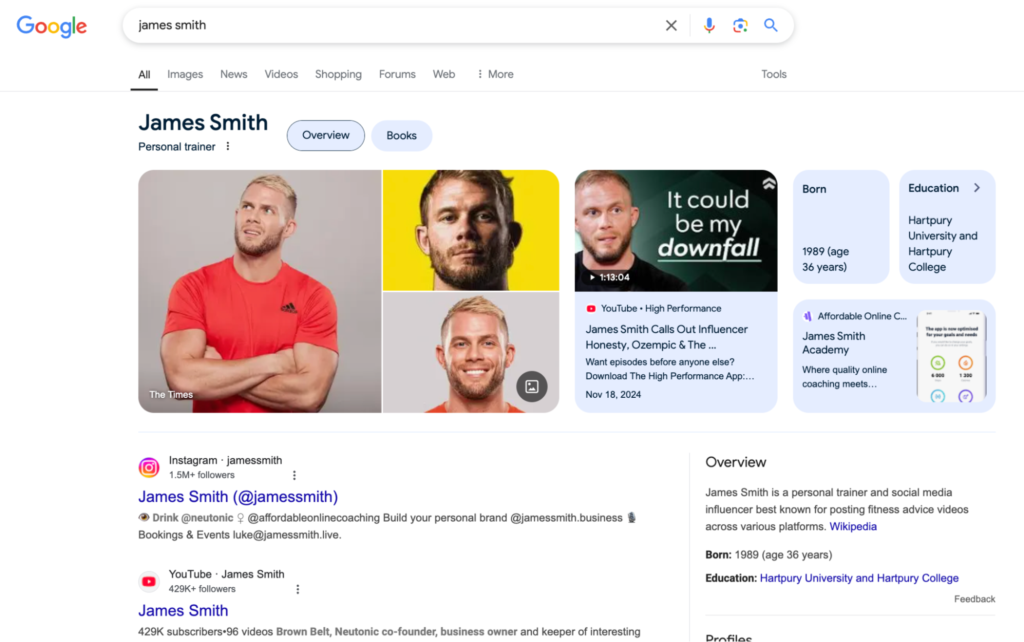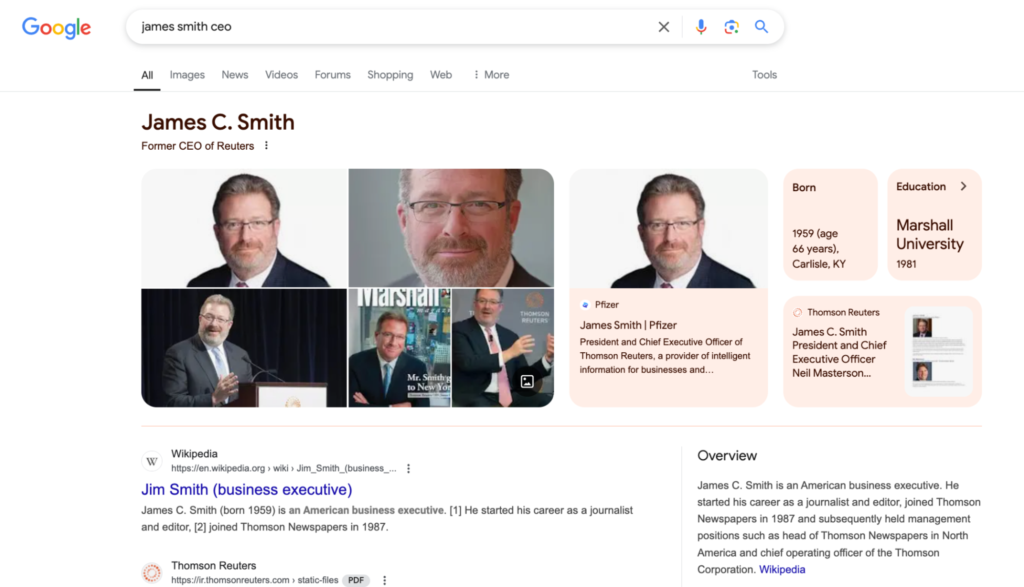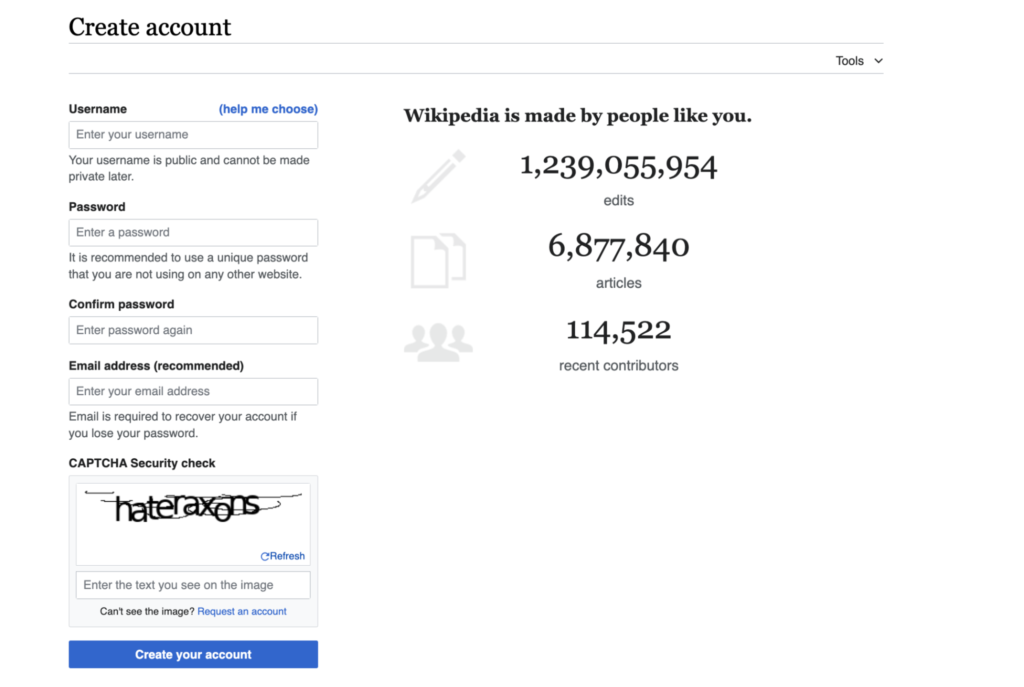Your online brand reputation directly impacts your credibility, trustworthiness, revenue, and growth opportunities.
While investment deals and hiring decisions might be completed in person, they don’t start that way. They start online when a potential investor, client, or new hire researches your brand.
Does that send alarm bells ringing? Are there results you’d really like to see disappear? Results that paint an outdated and inaccurate picture of who you are? Ignoring these results won’t help but will lead to lost deals, talent, and credibility.
Take action now. This guide will walk you through key threats affecting your online reputation and how to fix – or prevent – them.
Table of Contents
Beyond Your Owned Platforms: The Scope of Reputation Management

If you care about your brand reputation, it isn’t enough to only monitor your personal website and social media accounts. In fact, many people purposefully look beyond those sites for third-party, authentic reviews.
Google’s search results point people to news articles, Reddit threads, Wikipedia articles, AI, and review sites, all of which shape public perception:
- 85% of consumers trust local business reviews and over 99% consult them before choosing a business.
- 67% of consumers trust Google reviews the most.
- Social media is becoming a go-to review source with more than half of consumers turning to these platforms for local business recommendations: Instagram (52%), TikTok (42%), Reddit (40%), and YouTube (39%).
That gives companies a lot of ground to cover when it comes to maintaining their online reputation, but it’s necessary. When’s the last time you heard someone say they ignored a piece of negative news and it vanished on its own?
Exactly. Awareness is step one. Let’s take a look in more detail at what can – and does – go wrong.
Common Online Reputation Issues and Their Business Impact
How many of these situations have you faced in your business?
Brand Confusion From Messy Search Results
Does your brand share the same name as an unrelated entity, or is there a competing brand with a similar name? How about your CEO? Does he or she share a name with anyone?
Dueling names can lead to Google and other platforms confusing one with the other. This causes messy search results that can mislead customers and stakeholders. Even if no negative content is displayed, there’s also no factual information being shared. You don’t want investors to think you’re an insurance agency if you actually sell shoes, for example. Nor do you want someone to miss your CEO’s last announcement because all news results for his or her name pull up results for a stranger.


Negative News Articles or Google News Results
Crises, lawsuits, or other PR issues can quickly dominate search results. Even outdated news can continue to harm reputation years after the issue has been resolved.
Poor Reviews
Poor reviews absolutely affect hiring, and drive away potential customers and investors.
One negative review – if not countered – can cost you 30 new customers.
Review sites include Glassdoor, Indeed, Trustpilot, Google, Reddit, Yelp, Instagram, and YouTube.
AI-Generated Search Results

AI-generated search results include:
- Conversational responses from tools like ChatGPT, Gemini, Perplexity, and Microsoft Copilot
- Summarized brand information on search platforms such as AI overviews on Google’s search results and DuckDuckGo’s Assist
- Answers provided by Voice Assistants: Siri, Alexa, Google Assistant
The responses and summaries provided by these tools can misrepresent a brand if the information they draw from is inaccurate or biased. They can also emphasize negative news articles and reviews, whether outdated or not.
Wikipedia Challenges
Wikipedia is the fount of all knowledge as far as the internet is concerned. The online encyclopedia:
- Has billions of visits every month
- Consistently appears in the top three search results
- Supports Google Knowledge Panels, featured snippets, and “People Also Ask” sections
- Is a foundational data source for AI tools
- Both Reddit and YouTube direct massive traffic to Wikipedia
This means that a problem with a Wikipedia page isn’t isolated. It can spread across the internet faster than you think. As Wikipedia is a crowdsourced platform and can be edited at any time, page problems are not uncommon. This includes everything from biased to outdated content.
Reddit Issues
Reddit threads are displayed more and more often in Google search results. These threads feature high-intent, engaged audiences who hold nothing back. Whatever they want to say about a brand they will say – and Google is doing its best to feature those responses nice and high on the first page of search results.
This thread is from three years ago and it still ranks on the first page of Google:

How to Fix a Damaged Online Reputation

If you face one or more of these common online reputation issues, all is not lost. Here’s what you need to do.
Reclaim Control Over Your Google Search Results
First, identify problematic content with an audit of at least the first 2-3 pages of Google. Most people won’t look past the first page, but it’s good for a brand to know a little more about themselves. For example, there could be a positive result on the second page and part of your strategy may be trying to boost its ranking.
After the audit, you need to define your problem. It’s very difficult to remove a Google search result, so you’re most likely going to try to suppress a negative result. A good suppression strategy will use a combination of the following:
- Boost existing, brand-controlled (or owned) content
- Create new owned content
- Create social and business profiles
- Create a new website (if relevant)
- Guest post on high-authority websites
- Manage any Wikipedia content
For a detailed, step-by-step guide to this process read more here.
Work with Editors on Wikipedia
If Wikipedia is feeding inaccurate and/or biased information to the rest of the internet, you’ll need to work with other Wikipedia contributors to fix the issue.
This will not be a speedy fix. But, if you take the time to do it right, you won’t make the problem worse.
You will need to:
1. Make a Wikipedia account. Your account name should contain your name and company name to be clearly identifiable for other editors and readers. Ex: JohnAtSunChips


2. Declare your conflict of interest. Creating accounts with declared COI is commonplace on Wikipedia, and follows an established policy.
3. Visit the talk page of the article you care about.

4. Add a new topic to the talk page.

5. Give your topic a subject. In the description, put {{edit COI}} at the very top. Use {{edit COI |N}} if you are unfamiliar with Wikipedia’s COI guidelines and other policies. Use {{edit COI |R}} if you are requesting significant changes. Additional details can be found here.
6. Leave a detailed, respectful request of exactly what you would like changed on the page and why.
7. Use third party, respected sources to validate your request.
8. Sign your request. Use ~~~~ at the end of your request to add a signature and time stamp. Without this, your request will either be auto-declined or ignored.
9. Submit the topic and wait for a response.
[For a more detailed walk-through, see here.]
Are there other options? Yes. You can attempt to fix the content errors yourself, with or without making an account. Be aware that all edits are publicly logged and attributed to either an account name or an IP address. It isn’t illegal to edit a page you are affiliated with, but it does go against Wikipedia’s guiding policies. If you are caught, there will be repercussions. At the low end, this looks like reverted edits. At the high end of the scale, you’re facing a blocked or deleted account, and/or the article itself could be recommended for deletion.
If you want someone to help you with this process, whether you declare COI or not, here’s a post that describes your options.
Clean Up Review Sites

Complete an audit of all review sites. This includes Glassdoor, Yelp, Trustpilot, Tripadvisor, and Google, but there are plenty of other sites as well. Make good use of social listening tools to see who is talking about your brand and where.
Make a strategic plan for each site. They may have different response guidelines that you’ll want to work within. At a high level, we recommend responding to all negative reviews professionally and respectfully. It’s okay to have a broad template you use to plan responses, but be very careful of sounding like a robot. Consumers are placing more and more value on authenticity. You don’t want your response to seem insincere or irrelevant.
- 53% of customers expect businesses to respond to negative reviews within a week, but 87% of businesses do not address them at all. Here’s an easy way to outperform your competition!
- About 57% of consumers won’t use a business that doesn’t respond to reviews.
You can also encourage happy customers and employees to leave reviews. Don’t hound or bombard anyone – and for goodness sake do not require employees to leave positive reviews. If you do, when word gets out – and it absolutely will – your trustworthiness will plummet and you’ll have a real reputation issue on your hands.
However, you can:
- Periodically ask employees to leave reviews, if they’d like to do so.
- Encourage customers to share reviews by offering limited time discounts or extra loyalty points.
Respond to Reddit Threads
If Google is displaying negative Reddit threads, follow these steps:
- Take time to review the customer feedback to thoroughly understand the issue. Do not rush your response.
- Review the policies for the particular subreddit where the review is posted. Each subreddit has its own rules and moderators.
- If appropriate, respond to the review. Be genuine, transparent, and thoughtful. Offer solutions if applicable.
Every review and every reviewer is different. You may receive a positive response, no response, or an angry response. Keep your cool, maintain your positive, respectful attitude, and take it one review at a time.
Address AI-Generated Reputation Issues
Do your best to narrow down the sourcing behind the AI responses. Can you edit the source directly or request changes?
This will likely take time – and different generative AI tools often give different responses to similar questions – but work on what you can and monitor the ripple effect.
Preventing Future Reputation Damage: Best Practices

If you can head off a headache or a disaster, it’s always better. Be sure the following strategies are part of your regular marketing and PR work.
Ongoing Reputation Monitoring and Crisis Preparedness
First, we recommend everyone perform a brand audit. These audits will uncover:
- Gaps between perception and reality
- How to improve customer experience
- How to get ahead of competitors
- How to enhance engagement
If you want to strengthen brand loyalty, boost conversion rates, and inform smarter marketing decisions, you need a brand audit.
Secondly, research different social listening tools and set up the ones that make the most sense for your business. There are tools that will alert you to activity on major platforms, including Google, Wikipedia, and Reddit.
Finally, have a crisis response plan ready before you have issues. We have detailed guides for both Wikipedia and Glassdoor.
Proactive SEO & Content Strategy
You want to own your narrative. That means regularly publishing content on authoritative platforms.
If you’re scratching your head over what types of content to publish, take a look at your audiences. Where do they engage? Would they prefer videos, infographics, or long-form content?
Look at review sites and social media. What are your audiences talking about? Do they have questions you can answer? Pain points you address? Craft content around those topics.
Engage with Wikipedia and Reddit the Right Way
Wikipedia and Reddit are different platforms with different engagement guidelines, but they are both crowdsourced, and both frown on you swaggering in like a marketing mafia boss who thinks you can do whatever you want.
Pro tip: You are not in charge when it comes to either Wikipedia or Reddit.
However, you are welcome to engage – if you play by the rules – and should regularly monitor the sites.
Wikipedia
Your goal for Wikipedia is to maintain accurate, well-sourced Wikipedia pages. You need to:
- Define your Wikipedia footprint. How many different language articles exist about your brand, products, services, and key personnel? How many other articles mention the same?
- Are these pages and mentions accurate and up-to-date? If not, what needs to change?
- Create a strategy to maintain pages and mentions.
Engage in Reddit conversations thoughtfully and carefully. Do not astroturf: “Astroturfing is intentionally hiding the sponsor of a marketing message so as to make it look like it’s coming from grassroots supporters.”
Look for ways to humanize your brand on Reddit. Can you share things proactively? Start your own subreddit where you share behind the scenes information, humorous anecdotes, etc.? Stick with what makes sense and will be authentic to your brand voice, tone, and personality.
Strategies for AI
All brands are still learning how to influence AI, but there are a few things we know and a few tips we can share.
- Optimize your official content so it is easy for generative AI tools to understand who you are and what you do. Aim for consistency in language across all platforms and owned content.
- Contribute to credible sources that AI tools pull from. This includes Wikipedia and Reddit.
- Recognize you’re playing the long game. It can take awhile for different gen-AI tools to update responses.
Take Control Before It’s Too Late

Google’s search results dictate your brand’s reputation. Don’t ignore issues, or wait until a crisis goes viral to implement reputation management strategies. Start now and prevent costly future damage.
The Mather Group LLC is a digital marketing agency. We specialize in enhancing online reputations through authentic content and expert digital brand management. Clients trust us with Wikipedia services, SEO, PPC, and ORM. Don’t like how you’re showing up online? Let’s talk.



